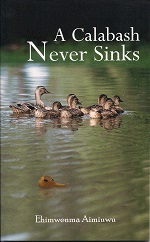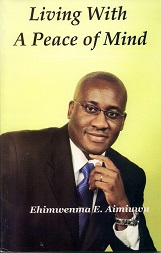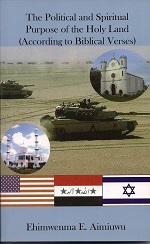 |
3. Mindu ruwa .......... (GUOSA LANGUAGE)
4. Yemoja/Yemaja ......... (YORUBA)
5. Ndem Mmo .............. (EFIK/IBIBIO) 6. Allah kogi ......... (made up by me in the
HAUSA LANGUAGE) because the word "goddess" does not
really exist in the Hausa but "ALLAH" meaning
"GOD"). I stand to be corrected on this. 7. Farr Ingmo ............ (GA LANGUAGE) IN
GHANA
8. Olukun ............. (OKPE LANGUAGE, DELTA
STATE OF NIGERIA)
I would like to confirm the traditional
Nigerian
name(s) of the word "Sea Goddess" or "Sea God"
To be continued.
ALEX G. IGBINEWEKA
The Azekazudo of Benin Kingdom; and,
Evolutionist.
www.dawodu.net/guosa1.htm
www.edofolks.com
********************************************************************
Dear Alex,
Greetings.I just wish to correct
the common mistake that Olokun is a
goddess.Olokun in Benin mythology is son of Osanobua, husband
of Ora and therefore male and a god.Thanks.
DR. NOWA OMOIGUI
**********************************************************
Brothers Osamwonyi and Uyi; and, Institute for
Benin Studies,
1. In Edo language, "Okun" meant (Sea)
There is no disbute about that.
2. "Ole" or "ol'" is an adjectival prefix meaning
the "chief", "pilot" "expert" "master" "leader" "ohen"
etc. etc.
3. Definition (2) above did not specify the
gender, therefore, the word "ole" may be used to refer to
a man or a woman. You also have words such as
"ol'ize" (Rice seller/dealer); "Ol'ibata" (Bata dealer)
etc.
4. In the light of the above you might well say
"ohen okun". OKUN IS NOT GOD AND GOD IS NOT OKUN. OKUN
SIMPLY MEANT (THE SEA, OCEAN OR BIG BODY OF WATERS"
I am in a hurry and shall revisit this again to your understanding.
Brother Hillary Evbayiro and others, kindly comment.
Meanwhile, thanks a great deal for your contribution.
From: "Alex Igbineweka"
***********************************************************
Olokun has always been described as one of
Osalobua's favorite child. Hence her worshipers pray and call to
OSALOBUA VBE OLOKUN. as Christians call to Jesus Christ and God.
Olokun has always been identified as the Goddess of the river.
Olokun has always been worshipped by both men and
women and her priest's have always been both sexes most especially
by women, and rarely do you see men worshiping olokun but usually
attached her brother Ogun for protection or support. Hence the
explanation from brother Alex referred to as female and institute of
Benin studies as a male God. You are both correct.
Olokun has always been identified as the beauty of the
waters. Beautiful women have also been described as
identical to Olokun. With names as simple as OLOKUN or
OLOKUNOROBO. Her children have often been referred to as Igbakuan
in
Edo language or Ogbanje as called by other tribes. Some call
mamiwater. ALL USUALLY BEAUTIFUL FEMALES,
My two cents.
Tina.
**************************************************
Sister Tina,
Yes, you are correct in your explanation
but, both men, brother Alex and the man
from institute of Benin studies cannot be
correct, brother Alex is only the correct
person here my dear. Olokun is a woman
period. That and that is the very reason
her brother 'OGUN' is always attached by her side
for protection or support. Olokun is not 'ABUM' which can be referred
to as male or female. In other for her not to stand
alone by her self, A man had to stand by
her,It is like Mr. and Mrs. or King and Queen.
It had never never be Mr. and Mr. nor Mrs.
and Mrs. unless may be the Oyibo way which is not our way.
********************************************************
Dear Friloye
The literature abounds with support for the position
that Olokun can be either male (God) or female
(Goddess) depending on the cultural context. Uyi is
right from a historical point of view. Alex is also
right because of the technically asexual (or sexually
neutral) meaning of the word Olokun
In original Benin mythology, yes, Olokun was (is)
male, but then the deity got transplanted to Ife by
Ekaladerhan and subsequently to Cuba during the middle
period. In other parts of Yoruba land it was adopted
by making Olokun the child of Yamoja.
Depending on who you read Olokun has been referred to
as either God or Goddess. Clearly the Olokun cult was very strong among Edo
women, but way before that it was at a level that
virtually made it State religion - tied into the most
fundamental Edo notions of the creation of land and
water.
It is incredibly similar to the Greek myth of Poseidon
- The brother of Zeus and God of the Sea
A FEW SAMPLES:
"The oldest son was given control of the waters by
Osanobua. The Bini call this son, Olokun (meaning the
god of the river). The other son was allowed freedom
to use his magical powers to balance out the negative
and positive forces of nature. He apparently
represents evil and the Bini call him Ogiuwu (or Esu
sometimes) meaning the harbinger of death. Ogiuwu is
supposed to own the blood of all living things. In
other words, no living thing can live forever.
Osanobua then settled in the realm of the spirit world
across the waters where the sky and the earth meet.
While Osanobua and Olokun represent aspects of life
such as good health, long life, good luck, prosperity
and happiness to which man may apeal through ritual
purity, Ogiuwu represents mourning, evil omen and
diseases." From [THE CORRECT HISTORY OF EDO, By
NAIWU OSAHON]
http://www.cwo.com/~lucumi/osahon.htm
"Pottery heads were made for shrines in the brass
casters' quarter; and life-size groups of royal
figures in mud are still made for the cult of Olokun,
divinity of the sea and of wealth."
From
http://users.pandora.be/african-shop/tribe_info.htm
".....fish-legged figure tells two stories about Oba
Ohen
Oba Ohen, who ruled in the 1400s, was a very handsome
man. After he broke a divine law, the gods paralyzed
Ohen's legs to punish him, according to one legend. A
sick or weakened oba is considered dangerous, so Ohen
hid his disability. His followers carried him into
council chambers before other officials arrived; they
carried him out after everyone had gone. Soon the
senior town chief, or the Iyase, became suspicious. He
hid behind a door and watched while Ohen was carried
away. But Oba Ohen's servants saw the Iyase. Ohen had
him killed on the spot.
The Edo were horrified by what Ohen had done. To kill
the people's representative, the Iyase, was a crime
against all the Edo. The people stoned Ohen to death
with lumps of purifying white clay. Ohen's son Ewuare
defended his father Years later, Ohen's son Oba Ewuare
gave the people a new explanation for why his father
couldn't walk. Ewuare said that the god Olokun had
sent power, like the electrical charge of dangerous
mudfish, into Ohen's legs. Since then, the fish-legged
figure has become the central symbol of Benin
kingship.
It reminds the Edo people that the Oba is divine; it
also cautions the Oba not to overstep the limits of
his powers."
http://www.lam.mus.ca.us/africa/tour/benin/ivory/002.htm
"For the Edo, who live in a tropical climate, coolness
symbolizes all that is positive in life - purity, good
luck, health and the watery world of the god Olokun. "
http://www.nhm.org/africa/tour/benin/008.htm
"Fashek was actually born in Benin City, the heart of
the Ancient Sini Kingdom, now in Bendel State of
Nigeria - Africa's most populous country. His mother
is an Edo woman from Benin. and his father, a school
principal, was a Yoruba man from Ilesha in Oyo State
of Nigeria. After his father died when he was just 11
years old, Fashek's mother, educated and very liberal
for a traditional culture, became a businesswoman,
supplying concrete to road contractors. Fashek's
family wanted him to become an engineer at first, but
he had already succumbed to the spirit of music. From
the beginning, his mother would bring him along to
participate in ceremonies celebrating her traditional
religion, where mainly women would play the Olokun
rhythm used for worship of the goddess of the river.
Playing the heavy rhythms and intricate syncopations
on maracas, Fashek says he'd "bring down the spirits".
http://www.waleoguns.itgo.com/majbio.html
"OLOKUN, son of OSANOBUA, once challenged his father.
A market place was set for the match. On the
stipulated day, the father, OSANOBUA, sent a messenger
to OLOKUN that he was ready. Surprisingly the
messenger was in the same dress OLOKUN wore. It was a
dress OLOKUM thought was the best to undo his father.
He, therefore, went into his room to put on a more
splendid one. But anytime he came out, he found the
messenger in the exact dress he wore. Realizing that
he could not even challenge his father's messenger
after several attempts, he gave up the challenge. The
messenger was the chameleon."
- Bolaji Idowu ,Olodumare: God in Yoruba Belief, p.
45, cited in
http://www.hypertextile.net/BLAKHUD/ind-reli/ind01.htm "In fact, the Yoruba and the Afro-Cuban Lukumi systems
have fused several traditions found in Africa. Deities
from Dahomey (Obaluaye, Nanu, Nana Buruku, etc.) and
Benin (Olokun) are among them. In the case of the
deity known as Olokun from Benin, John Mason documents
that, '...in the 12th century A.D.., Prince
Ekaladeran, the only son of Ogiso Owodo, was banished
from Benin City by his father, and then founded the
town of Ughoton, established an Olokun shrine for
communal worship, and later introduced Olokun worship
among the Yoruba. Ile Ife is the only city in
Yorubaland where Olokun is actively worshipped'...;
this, despite the fact that Orisas are known to come
from many places throughout Yorubaland, Dahomey and
Benin.
In contrast, Olokun is widely accepted amongst the
followers of Cuban Palo and Lukumi traditions, and is
considered to be one of the most influential and
respect deities.
"Both the shrine sculpture and the sacred drums
employed by the Lukumi in Cuba, when they worship
Olokun, shows a direct link with the Edo of Benin" ---
John Mason, Orin Orisa, 1992 " - from Respecting &
Recognizing Established Afro-Cuban Traditions
[http://www.palo.org/articles/kimbisa.html]
Nowa
|
|



![]()